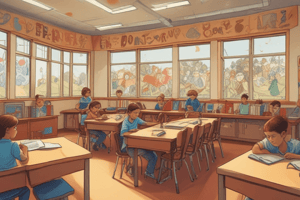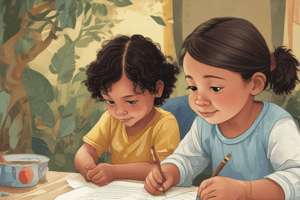Podcast
Questions and Answers
ما هو اسم الكلية التي تتعلق بعلوم الطفولة المبكرة؟
ما هو اسم الكلية التي تتعلق بعلوم الطفولة المبكرة؟
- كلية التربية للطفولة المبكرة (correct)
- كلية الآداب
- كلية العلوم الإنسانية
- كلية إدارة الأعمال
أي قسم يندرج تحت كلية التربية للطفولة المبكرة؟
أي قسم يندرج تحت كلية التربية للطفولة المبكرة؟
- قسم التكنولوجيا
- قسم علوم الحياة
- قسم الفنون
- قسم العلوم التربوية (correct)
ما هو المقرر الدراسي المذكور في المحتوى؟
ما هو المقرر الدراسي المذكور في المحتوى؟
- طرق تدريس اللغة العربية
- مدخل إلى العلوم التربوية ومرحلة الحضانة (correct)
- أسس علم النفس
- مدخل إلى العلوم الطبيعية
ما الغرض من إعداد المحتوى المذكور؟
ما الغرض من إعداد المحتوى المذكور؟
أي من الجوانب التالية لا يتعلق بالعلوم التربوية؟
أي من الجوانب التالية لا يتعلق بالعلوم التربوية؟
Flashcards
التربية المبكرة
التربية المبكرة
فرع من فروع التربية يهتم بدراسة نمو وتطور الطفل من الولادة حتى سن السادسة، ويهدف إلى تقديم أفضل أساليب التعليم والرعاية خلال هذه المرحلة.
مدخل إلى العلوم التربوية ومرحلة الحضانة
مدخل إلى العلوم التربوية ومرحلة الحضانة
مقرر دراسي يتناول الأسس النظرية والتطبيقية لتعليم ورعاية الأطفال في مرحلة الطفولة المبكرة.
مرحلة الحضانة
مرحلة الحضانة
مرحلة مهمة في نمو وتطور الطفل، تبدأ من الولادة وتستمر حتى سن السادسة، تتميز بتغيرات سريعة في جميع جوانبها.
معلم الحضانة
معلم الحضانة
Signup and view all the flashcards
قواعد السلوك في مرحلة الحضانة
قواعد السلوك في مرحلة الحضانة
Signup and view all the flashcards
Study Notes
Course Information
- Course Title: Introduction to Educational Sciences and Nursery Stage
- Course Code: NE 112
- Credit Hours: 2
- Level: First
- Semester: First 2024/2025
Course Description
- Topics include:
- Definition and importance of educational sciences.
- Relationship of education to other sciences.
- Classification of educational institutions.
- Evolution of early childhood education thought.
- Characteristics and cultural contexts of pre-school children.
- Nature of Educational studies in pre-school education.
- The course explores the concept and significance of education, its relationship with other disciplines, and the historical development of educational thought in early childhood settings. It also examines the characteristics and cultural context of pre-school children and the nature of educational studies relevant to their growth.
Sustainable Development
- Definition:
- Sustainable development is the prudent and targeted use of renewable resources without depleting or degrading them. It encompasses wise use of limited resources so future generations retain these benefits.
- Characteristics:
- Interconnectedness and complexity, merging natural and social elements.
- Meeting the needs of the most vulnerable in society.
- Enhancing spiritual, cultural development while maintaining cultural uniqueness and heritage.
- Integration of qualitative and quantitative aspects.
- Addressing international dimensions, emphasizing the role of rich countries in assisting poorer nations.
- Fields:
- Economic development: Sustainable actions, coordinated policies to improve quality of life.
- Social development: Fostering mutual relationships, education, awareness, policies, and health. Focuses on both government and NGOs.
- Three perspectives: care, services, and social change.
- Environmental development: Protecting environment and resources, maintaining balance and biodiversity. Meeting current needs without hindering future ones.
- Education for sustainable development:
- Including sustainable development concepts in subjects like science, geography, citizenship, history, and technology.
- Supporting projects by students, such as recycling, organic farming, renewable energy.
- Developing technical skills related to the green economy.
Educational Institutions
-
Family:
- The primary social unit where children are nurtured from birth, shaping their basic values, behaviors, and cultural norms.
- It's a significant agent of socialization, transmitting cultural heritage and values.
- Biological functions (reproduction and raising children) and education.
- Role in shaping the child's social and cultural development
-
School:
- A formal social institution responsible for education and skill development in multiple disciplines, bridging family and community.
- Includes physical environment, curriculum, teaching styles, and relationships among teachers, pupils, and families.
- Supports the holistic development of children.
-
Peer group:
- A vital social environment outside the family, guiding children into wider social interaction and norms and values.
- Influences behavior, social values, and skills.
- Direct influence on socialization.
-
Media:
- A significant educational tool conveying knowledge, ideas, behaviors, and cultural traditions through diverse forms (print, broadcast, digital).
- Providing a wider perspective for society, cultural, and global issues.
- Can be a significant tool for shaping public opinion.
-
Clubs/Organizations:
- Providing structured environments for various activities and skill or hobby development (e.g., sports, art, music, debate), facilitating social interaction and growth.
- Fostering teamwork, leadership skills, and cooperation.
Studying That Suits You
Use AI to generate personalized quizzes and flashcards to suit your learning preferences.




